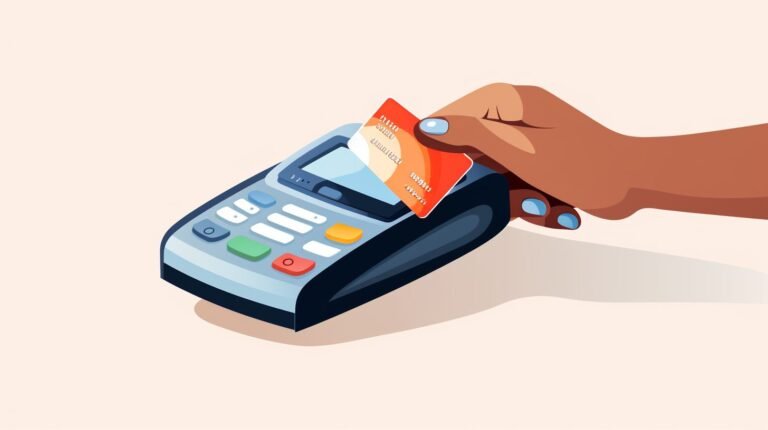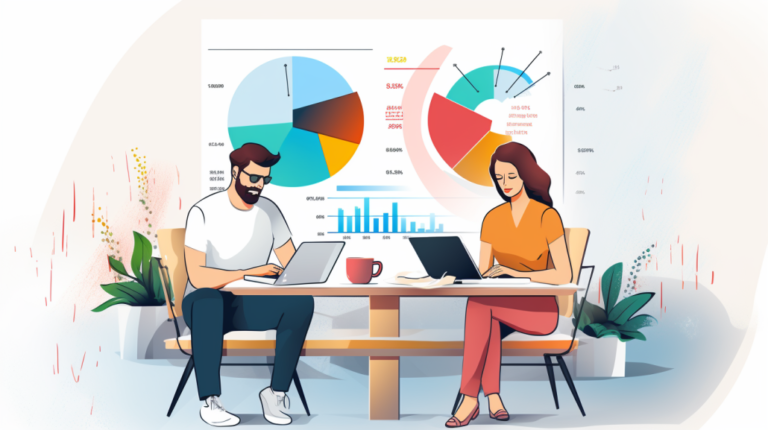Credit Cards vs Debit Cards: What’s the Difference?
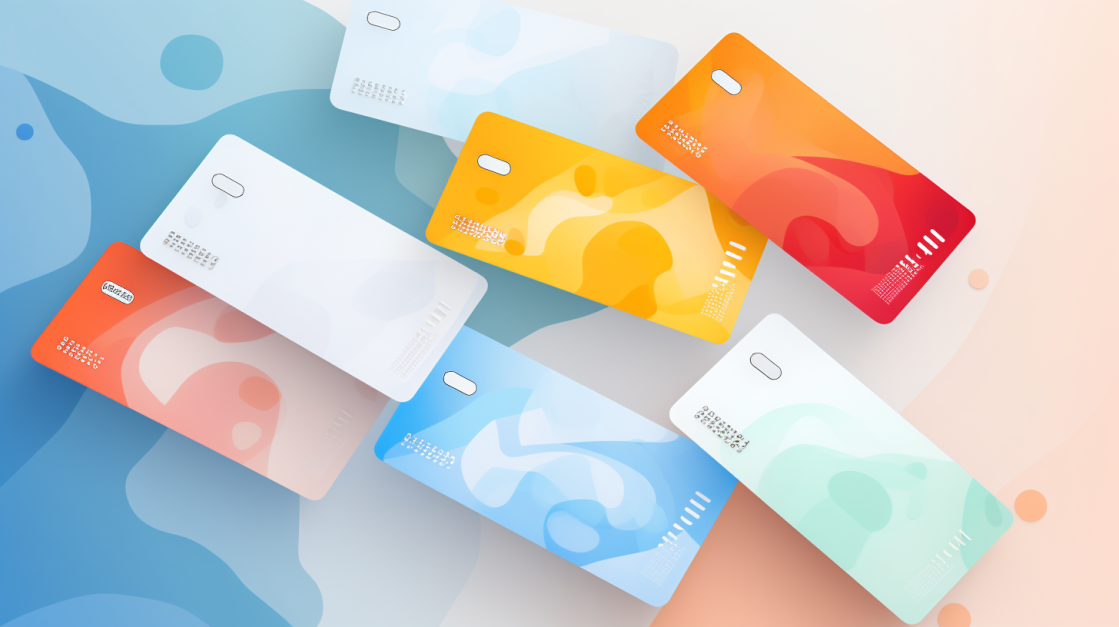
Feeling a bit muddled about the difference between debit and credit cards? You’re definitely not the only one. It’s safe to say that many of us find it tricky figuring out which is best suited for our needs, particularly in today’s cashless culture where both are widely accepted modes of payment.
From deciphering interest rates to understanding rewards programs, this comparison will serve as your helpful guide through the maze of these financial instruments. Ready to unravel the labyrinth around Credit Cards vs Debit Cards?.
Key Takeaways
- Debit cards let you use money from your own bank account. Credit cards let you borrow money to buy things.
- Credit cards offer rewards, help build credit and can pay for emergencies. But if not paid on time, they carry high interest and debt risks.
- Using debit card is like using cash: No debts or interests but it won’t help build credit score.
- Both types of cards come with security measures but credit cards usually give stronger protections.
Understanding Debit Cards
Debit cards give you a quick and hassle-free way to pay directly from your checking account. They’re simple to use – each time you transact, the amount gets deducted from your bank balance.
Debit cards have their advantages like easy cash access via ATMs, no debt accumulation as you’re spending what you already have, and they also come with zero or lower fees compared to credit cards.
However, they do carry potential downsides such as overdraft fees if you spend more than what’s in your account and limited fraud protection in case of unauthorized charges. Understanding these facets helps utilize debit cards effectively while managing financial health responsibly.
Definition and Working of Debit Cards
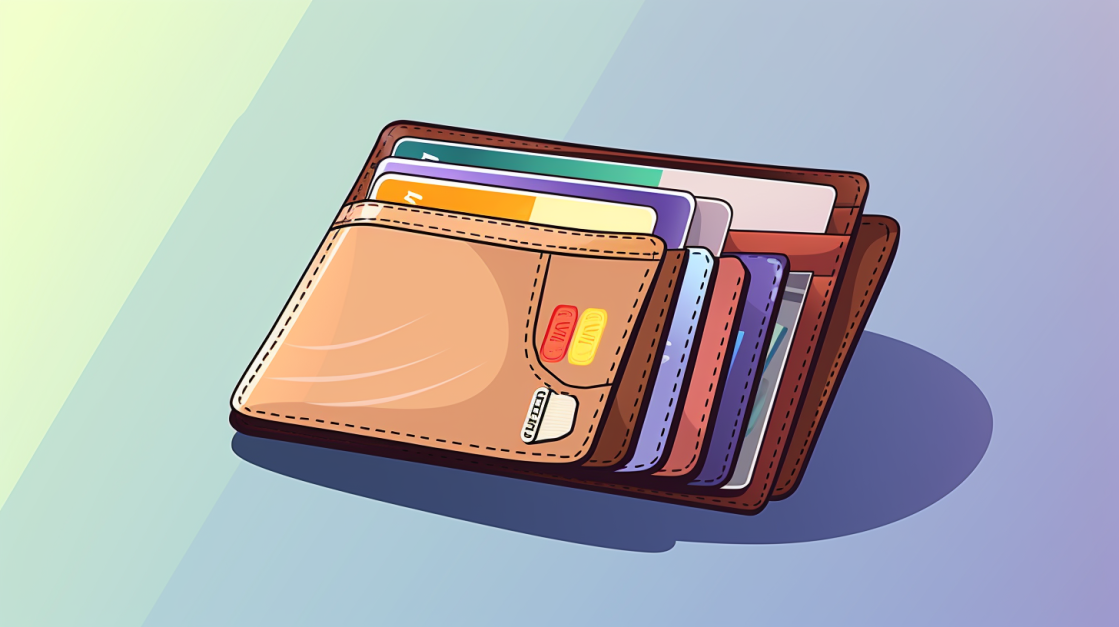
A debit card is a type of plastic money. It is tied to your checking account at the bank. When you use it, the money comes right out of that account. Think of it like an electronic check.
Debit cards work at ATMs too and can be used for cash withdrawals or fund transfers. Since they’re linked to your own money, debit card payments don’t pile on interest charges like other kinds of credit-based cards do.
If someone steals your debit card, some banks won’t make you pay for what the thief bought with it! But here’s something interesting – using a debit card doesn’t help build up good points on your credit history scorecard.
Advantages of Debit Cards
There are many good things about using debit cards.
- Debit cards offer easy access to your own money.
- These cards don’t build up interest charges. This is unlike credit cards that do.
- Banks often secure your account from unwanted charges if you lose your debit card or someone steals it.
- You can use debit cards at ATMs for many things. You can take out cash, put in money, check how much money you have, and move money to a different account.
- Some banks won’t charge you an overdraft fee if you spend more than what’s in your account.
Potential downsides of Debit Cards
I want to tell you that debit cards have some downsides too. First, they can’t help you build credit. It’s important to know because having a good credit score is key for many things. Second, using a debit card might lead to overdraft fees. If you spend more cash than what’s in your account, the bank may charge you extra money. Third, not all debit cards offer full fraud coverage. This means if someone steals your card and uses it, you might lose money. Lastly, some banks or credit unions can also slap on overdraft fees for approved transactions. So watch out for these things with debit cards!
Understanding Credit Cards
Let’s delve into the world of credit cards – these powerful little plastics allow us to buy now and pay later! With their unique ability to offer revolving credit, they provide financial flexibility but also require careful handling.
From building your credit score to rewarding you with bonuses, there are numerous advantages at hand. However, if used recklessly, the high-interest rates can lead to debt accumulation before you know it.
Definition and working of Credit Cards

A credit card is a shiny, small piece of plastic. It lets you buy things now and pay for them later. A bank gives you a credit limit – this is the highest amount you can spend on your card.
The size of the limit relies on how well you have handled money before (creditworthiness) and your past payments (payment history). You use your credit card to make buys all through each month or billing cycle.
At the end of each cycle, the bank sends out a list showing what you bought and how much it costs (credit card statement). To avoid having to give extra cash for interest, always try to pay off everything by the date shown on that paper.
Using a credit card wisely could help make your credit score better over time.
Advantages of Credit Cards
Credit cards come with many benefits. Here are some great things about them:
- They help build credit. When I use a credit card and pay it on time, this helps me create a strong credit history.
- They can give rewards. Some cards offer points, cash back or travel benefits when I buy things.
- They are good for an emergency fund. If there is a big problem and I need money quick, I can use my credit card to pay for it without emptying my bank account.
- They offer purchase protection. If someone steals my credit card number and buys stuff, most of the time I don’t have to pay for those charges. If something I bought breaks right away or never comes in the mail, the credit card company will normally get my money back!
- They can extend warranties too! On some items that I buy, my credit card might make its warranty longer so if it breaks after a long time, it could still be fixed at no cost.
- Finally, they allow larger spending limits than debit cards do. That’s good for big trips or events where you may spend more money than normal!
Potential downsides of Credit Cards
Credit cards have some downsides too. Here they are:
- You might face high interest rates and fees. This is most likely if you delay your payments.
- Your credit scores can take a hit if you do not use your card well.
- If you tend to carry a balance on your credit card, it can cost you a lot in interest charges.
- Many credit cards come with an annual fee which debit cards do not have.
- Making only the smallest payment required could trap you in revolving debt, making it hard to escape from that cycle.
Key Differences between Debit and Credit Cards
Debit and Credit cards might appear similar, but their behind-the-scenes operations tell a different tale. Plunge into our discussion as we untangle the threads of spending limits, repayment terms, effects on credit score and their unique security measures.
You’ll never mistake one for the other again after this! So keep reading….
Spending Limits
Credit cards and debit cards take different paths with spending limits. With my debit card, I can only spend what’s in my checking account. No set limit is there, but if I use too much, overdraft fees may show up.
Capital One gave me a break by erasing such fees. On the flip side, credit cards work on borrowed money. The bank sets a credit limit for you to borrow against it based on how trustworthy you seem and your past payment actions.
Repayment terms
A credit card lets you borrow money. You need to pay this back by a due date. If you do not, they charge you extra fees and high interest. This is called a repayment term.
Debit card use is different. It uses the money which is in your bank account when you buy things or get cash out. If there’s no money left in the account, the bank can say no more buying until there’s more money put back in.
Impact on Credit Score
Using a credit card can help build a good credit score. But, you need to use it right. Paying your bill on time is key for this. If you don’t pay your bill in full by the due date, it hurts your score.
A debit card does not change your credit score at all as money spent comes straight out of your bank account.
Security Measures
Keeping money safe is a big deal. Credit cards and debit cards both have good ways to do this. Debit cards can have $0 liability for unauthorized charges. That means if someone steals your card and buys something, you don’t need to pay the bank back.
It’s like the bank says “It’s not your fault, you don’t owe us anything.” But wait! Your credit card has good things too. They give other benefits like travel insurance and help services when things go wrong on trips.
Plus many banks offer $0 liability for lost or stolen debit cards just like that of the debit one as well! So, both types of cards are working hard all day long to keep your money in good hands!
Choosing between Credit and Debit Cards
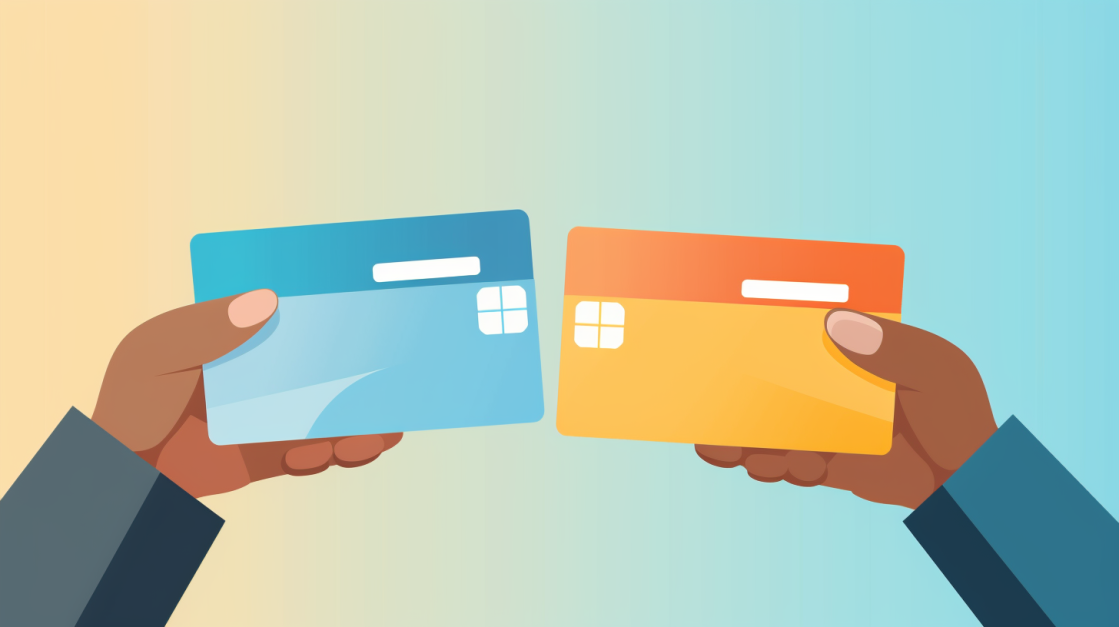
When it comes to choosing between a credit and debit card, you’ll want to consider various factors such as your spending habits, credit score potential, need for rewards programs or cashback options, risk tolerance for debt, and overall financial goals.
We will delve deep into the recommended usage scenarios of each card type so that you can confidently choose which fits best for your personal needs.
Factors to Consider
You need to think about some things if you want to pick between a credit card or debit card.
- Look at your money habits. Will it be easy for you to pay back the money you spend with a credit card?
- Think about what kind of buy will you make most often. If it’s small buys, maybe a debit card is best. If it’s big buys, then maybe a credit card is best.
- Another thing to think about is how safe you feel using each card type. Credit cards can protect your money better than debit cards can.
- Find out if the credit card has fees each year or not.
- How high are the interest rates on the credit cards?
Recommended usage scenarios for each
Debit cards and credit cards each have good uses. It depends on your needs.
- You are making daily small buys such as gas or groceries.
- You want to avoid paying interest fees.
- You plan to get cash from an ATM.
- Big purchases or emergencies – you can pay them off over time.
- Building your credit score.
- Earning rewards like cash back or travel points.
- Buying things online where you need more security.
How Can Building Good Credit Help Me Choose Between Credit and Debit Cards?
Building good credit can impact your ability to choose between credit and debit cards. By establishing a strong credit history, you’ll gain access to better credit card offers and rewards. This can save you money and provide additional financial flexibility. For those with bad credit, following tips to repair bad credit can be a crucial step towards rebuilding their creditworthiness.
Frequently Asked Questions about Debit and Credit Cards
People often have questions about debit and credit cards. A common one is, “Can a debit card build credit?” No, using a debit card will not help you build credit. It only lets you spend the money in your bank account.
Another question many ask is, “Do I need to pay back what I buy on a credit card right away?” No, you do not have to repay at once, but we say it’s best if you can. By doing this will avoid paying interest fees.
Many are confused about security too.They might want to know which one gives more protection from fraud? Both offer forms of fraud coverage. But usually, with lost or stolen reporting and zero liability protections provided by Fair Credit Billing Act , credit cards generally offer better protection compared to the Electronic Fund Transfer Act for Debit Cards.
Then others wonder how ATMs fit in all this. They ask,” Can both be used at an ATM?” Yes! You can use both at ATMs for banking jobs like taking out money or checking your balance. Although remember that cash advances from credits cards could come with fees.
Your questions are valid and normal! Learning helps us make smart choices when it comes to our wallets!
Conclusion
Choosing between a credit card and debit card impacts your money. Knowing the differences helps you manage your cash smartly. Make sure to know about fees, interest rates, and rewards before picking one.
Trust me, the right choice is all about what works best for you!
FAQs
1. What is the main difference between credit cards and debit cards?
The main difference lies in where they pull money from. Debit cards remove cash from your checking account, while credit cards borrow money to be paid back later.
2. How do credit card interest and minimum payment work?
Credit card interest applies if you only make the smallest required payment or “minimum payment”. You can avoid this by fully paying off your statement balance each month.
3. Can I use my debit card for automatic payments?
Yes, both debit cards and credit cards can set up automatic payments for bills, wire transfers or store charges under a certain limit.
4. Are there rewards with using a credit card?
It depends on the type of card! Cash-back, travel rewards, premium and no-frills offer different benefits like airline miles or points towards free items at stores.
5. Why are annual fees charged on some Credit Cards?
Some specific types of Credit Cards charge an annual fee because they give extra perks like bigger reward programs or special coverage like trip cancellations payouts that regular ones don’t.
6.What steps should one take when their Bank Card gets lost?
If you lose any bank card (credit or debit), notify your bank right away on phone about your missing item so as to halt its working status instantly and prevent fraudulent charges.


